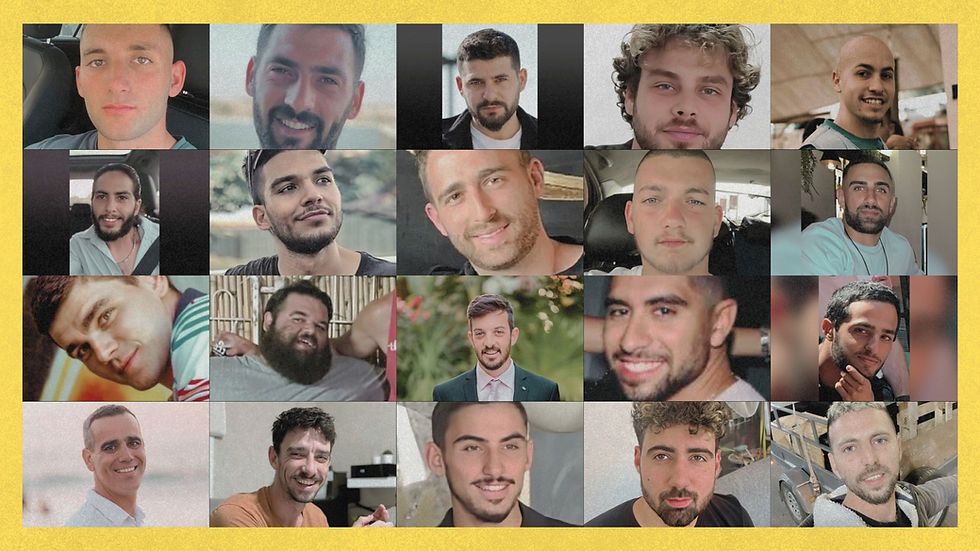Understanding Israel’s Secular vs Orthodox Culture
- Ron Cantor

- Mar 14, 2019
- 4 min read
I recently watched a fascinating documentary about one of Israel’s fresh, young faces and her husband. She is a presenter on several TV shows. Coreen Gidon met her fiancé at a bar in Tel Aviv. At the time, she didn’t realize that he came from an ultra-religious home with 14 children.
The Pretty People
I know the “Coreens” of this city. I know Tel Aviv and I know how the “pretty” people of this city think. They are in a bubble. Not unlike Hollywood. They come from successful families of lawyers, builders and entertainers, if not generals and politicians. They love the army and are proud of the land of the Bible, though few believe in the God of the Bible. Throughout my years here, I have found myself, strangely, in places I never expected to be, rubbing shoulders with these people.
But I never understood how far their world is from Orthodox Judaism. Most American Jews, even if not religious, have a high regard for the Orthodox. Not so in Israel. In fact, there is great enmity. My wife’s family is traditional—we call them masorti. This means that though they are not super religious, they honor Shabbat; they keep kosher and love the holidays. I have lived in that world for 16 years.
But watching this special about the growing relationship between Coreen and Cheli (short for Yekhiel) was fascinating. It was as if aliens and Martians met for the first time. On the one side, you have super secular Coreen. Liberal, pro-gay marriage, surely pro-abortion and pretty much everything else you can imagine. Then you have Cheli. His parents are American immigrants like me. They are fluent in Hebrew and fully assimilated. They live in a different world; a world that Cheli, unlike his brothers and sisters, left. They are against homosexuality and are most likely anti-abortion. Their entire lives are governed by religion.
First Visit
On Coreen’s first visit with his parents, they would celebrate Passover. She was terrified. “They start at 6:30 pm and eat at 11:30 pm,” Cheli told her. She asked about how she would make it until 11:30 pm, “Make sandwiches with matzah,” he joked. An orthodox Jewish Seder (meal on the first night of Passover) is really long. She was utterly unfamiliar, despite growing up in Israel. Surrounded by more than a dozen orthodox Jews, she was terrified. The woman, who confidently stands in front of the nation every week on television, was out of her element. And yet, she was completely committed to honoring his family.
He is not Jewish
She jokingly asked how his parents would react to him bringing home a “shiksa,” a somewhat derogatory word for Gentile girl. That is how she felt—like he was bringing home a non-Jew, even though she is obviously Jewish. It reminded me of a time when I was driving in Jerusalem on Shabbat. A grandfather crossed the street with his grandson. He looked at me and looked at the boy and said, “Hu lo Yehudi — He is not Jewish,” because I was driving on Shabbat.
At one point, after she got to know his parents and really started to love them, she asked about why men and women can’t touch. I remember visiting Israel in 2000 and meeting an orthodox family. Without hesitation, I extended my hand to the mother to shake it. She just looked at my hand and smiled. I was wondering, what’s wrong with this lady? Elana had to whisper to me that she could not shake my hand, as Orthodox Jewish women do not touch men.
Coreen finally says to Cheli’s father, “But I want to hug you! Why can’t I hug you?” It was a powerful moment in the documentary. For Coreen, to hug her soon-to-be father-in-law was the most natural, loving thing in the world. But for him, it was forbidden, unthinkable!
Two Worlds Meet
As the documentary continued, we see the two families interact. They both come to realize that they really love each other. They see that their preconceived judgements were wrong. There is one part where Coreen’s super secular father starts playing the seven blessings that are sung at Jewish weddings, from his iPad. He sings and dances with his daughter, “we will dance on the streets of Jerusalem.” He is being funny, lovingly mocking the religious, but he is also embracing the fact that his daughter is marrying into another world. They continue, “The voice of the bridegroom and the voice of the bride.” Coreen breaks down in tears as her father hugs her.

To Kiss or not to Kiss
Of course, the big dilemma is the wedding. She is a Tel Aviv’eet and wants to wear a modern dress. But that will offend Cheli’s family. They compromise and she wears a modest dress during the ceremony and changes later, allowing the religious guests to leave if they want. They are walking a cultural tightrope.
The final conflict to overcome is whether or not they will kiss when the rabbi pronounces them man and wife. Coreen is stunned that this is not allowed. It is a bridge too far for a girl who dreamed of a wedding her whole life—not like this! Cheli bends and says, “No one ever died from a kiss. No one is going do ‘gevault’,” a Yiddish word meaning, yelling in alarm or shock.
In the end, they kiss.
It was a fascinating look into Israeli life and culture. I wish it had subtitles in English. But if you want to see it, here is the link:










Comments